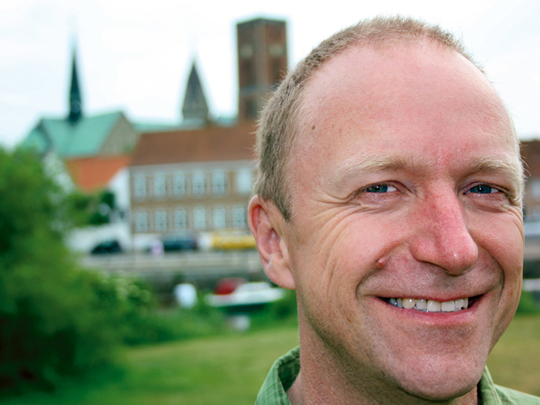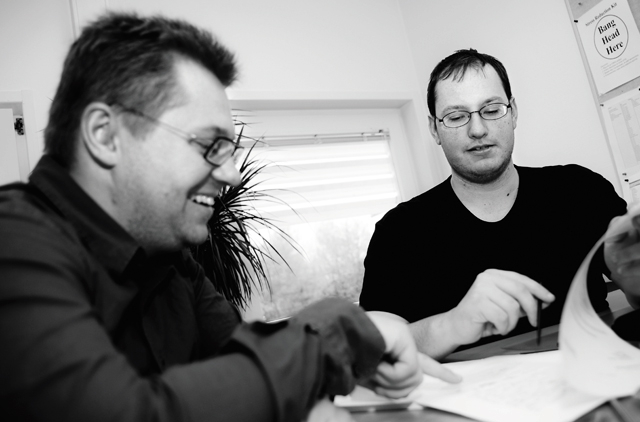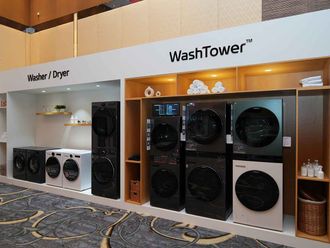
What the world labels as a disability can very often be turned into an advantage - if you are brave enough to defy the conventional ethos. And few people know this better than Danish-born Thorkil Sonne.
When his youngest son, Lars, was diagnosed with an autistic spectrum disorder (ASD) at the age of three, he was crestfallen. "It was devastating for us parents to realise that our son had a lifelong disability and that he would never have the chances his siblings would to enjoy life," says Sonne, who was a technical director of a Danish software venture.
But once he came to terms with his son's condition, he was determined that Lars would not be made to feel any different from his siblings. Sonne had seen many special needs people being treated differently in society but Lars he decided would receive the same love and affection that would be given to his siblings.
Sonne also found that his son, although autistic, was blessed with extraordinary memory. He also had a fantastic eye for detail - traits fairly common among people with ASD.
While many people still see autism as a condition that can cause issues in a work environment, Sonne believes such individuals can be given productive employment.
"I learned that most of them [individuals with ASD] have the same needs as ‘ordinary people' - to be included in the labour market and be respected for their personality and skills. In addition, I saw people with autism having so many skills, which [normal] employees lack, [but] which could become valuable for the business sector. For instance, they have good memory, a structured way of working, can think out of the box, have a passion for detail and are capable of doing repetitive tasks with unceasing enthusiasm," says Sonne.
"Maybe it is our society that has become too eager in excluding people who do not fit into the mainstream. I found out that there are a lot of wonderful people with autism spectrum disorder and their families are struggling to find them a place in the world," says Sonne.
A leader in the making
Sonne was born into a family of four siblings. He grew up in a small rural community of Jylland in western Denmark.
"One of the defining moments in my life was when I travelled to the US on my own for eight months. I learned about hospitality and openness in a small Midwest community where I stayed with my host family. Being from a small country, all my senses were introduced to a whole new level of opportunities."
About three decades ago, he met his wife, Annette, who also held very strong views about the importance of integrating people with special needs into mainstream society, particularly the workplace.
With her support, Sonne decided to realise his dream - of forming a company which would employ a large majority of people with ASD.
He became active in the Danish Autism Association (he was the president of the association for three years) and researched more on the condition. He learned that one of the major problems people with ASD faced was getting a chance to represent their skills in the corporate market.
Specialising talent
In 2004, he mortgaged his house and used the money to set up Specialisterne (Danish, for specialists); the first company in the world to focus on a special working environment for people with ASD.
With its headquarters in Copenhagen, Denmark, it provides services such as software testing, quality control and data conversion for leading companies in Denmark. In addition, it assesses and trains people with ASD to meet the requirements of the business sector.
Today, Specialisterne has more than 50 employees of which around 35 are diagnosed as being within the autism spectrum.
One arm of the company - Enabling Centre Services - includes training programmes to assess and build up personal, social and professional skills for people with ASD. No formal education or job experience is required to enrol in this programme.
"I am very happy to have realised that the business sector is very pleased with our services," says Sonne.
"Our management model makes it possible for us to work at the customer's premises offering us close proximity with our clients. Our consultants work part time as their life is more complicated which [necessitates] additional management.''
The feedback from his customers has been positive, he says. "They are happy to include our consultants in the daily work. I think there is a huge potential in developing a management model which will make mainstream companies able to hire and manage people with autism themselves, with our guidance," he says.
A million special deeds
In December 2008, Sonne went one step further and donated all shares of Specialisterne to the Specialist People Foundation (a non-profit organisation founded by him).
The foundation aims to create one million jobs for Specialist People around the world.
Sonne clearly defines who he means by the term ‘specialist people': "People with a business potential that can be realised with special understanding and management, like people with ASD. The goal is to create awareness in the global community and to support the integration of such people into the labour market.''
Sonne decided to set up the organisation after he started receiving an overwhelming number of queries and requests from people who wanted to know more about the Specialisterne concept. "People from more than 55 countries were showing an interest in the concept,'' he says. "I also wanted to demonstrate to their societies that people with autism can become integrated in the labour market and have meaningful lives.
"The strategy is to transfer the Specialisterne concept and make it fit the need in all countries and cultures. It showcases what is possible if you share the mindset that behind many disabilities you can find special abilities. The concept will be attractive for authorities, policy makers and businesses to learn our management model in order to make special people wanted, and give them the framework to excel."
Acts of bravery
People in the autistic spectrum are not flawless but neither are they incapable of productive work. With a workforce of 75 per cent falling in this range (autistic spectrum), Specialisterne may have ended up becoming a utopian concept. But the company now makes $2 million per annum!
Recognising this remarkable feat, the Atlantic Monthly ranked Sonne as one of the 27 Bravest Thinkers of the decade (alongside Apple's Steve Jobs, the US Federal Reserve's Ben Bernanke and Zimbabwean Prime Minister Morgan Tsvangrai).
"It felt fantastic to be named a ‘brave thinker' side by side with presidents and very successful business people," says Sonne.
"The nomination motivated me to dream bigger. I want to make a global impact on helping people with autism and their families. I feel I am part of a global family when I meet families with a child or adult with autism. We share the same emotions, frustrations and hopes - regardless of the country, religion or culture we belong to. If we can bring the power of love for our vulnerable family members into a global context, we can give people with autism a better chance for a meaningful life. Alone we may not be able to do much but together, we can change the world."
Sonne has also been adopted in the global network of social entrepreneurs, Ashoka Globaliser, as one of their Fellows. "This is a boost on the way to enable one million jobs," he says.
Harvard Business School now uses Specialisterne as a case study in social-enterprise business.
In September 2009, Specialisterne started a school where youngsters with ASD can get an education with a focus on social development and interaction with its offices. The school is funded with help from the Lego Foundation and the Danish Ministry of Education.
Positive energy
"I am a great admirer of Nelson Mandela," says Sonne. "During the World Autism Congress in 2006 which took place in Cape Town, I got a chance to visit Robben Island where he was imprisoned for many years. I admire the fact that he did not seek revenge when he was released - instead he united the much-divided nation."
Sonne says he picked up lessons about social entrepreneurship from the work of Nobel laureate Mohammad Younus. "I found a role model in Mohammad Younus, founder of Grameen Bank. He saw the injustice meted towards poor people in Bangladesh and decided to make a difference - now millions of poor people are getting a chance to do business funded by micro loans."
The Specialisterne Company has plenty of case studies to offer about their employees experiencing fulfilment in their jobs. "Our record holder has been [a person] who was unemployed for close to 25 years until he came to us. Now he is integrated in the labour market working for Specialisterne. He does not have to be invisible anymore when people talk about their lives and careers," says Sonne.
The idea grows
As the company grows, it aims to do research and development on how the knowledge derived from working with people with autism can benefit people with other challenges - like ADHD (Attention Deficit/Hyperactivity Disorder).
Sonne hopes to dispel the trend of people being diagnosed with ‘special needs'. "We want them to be people with a business potential who need special understanding and support to excel," he says.
"I visited the Dubai Autism Centre in 2008. I have also been in contact with people in other Middle East countries to discuss the possibilities for transferring our knowledge into the local context. It is obvious that people with autism are the same globally - and so are the needs in the business sector. The challenge is to find a model that can benefit states in the Middle East as much as possible with respect to the local tradition and culture."
So his personal dreams?
"On a very personal note, I want Lars to have a good life as an adult and a job where he is respected for his special personality and appreciated for his unique skills. I'm very privileged to be able to work with my life dream of making a difference for Lars; To see it grow into something that can make global societies respect and accommodate special people as valuable and worthy citizens.
"We would love to work together with local entrepreneurs in a setup where they can benefit from their understanding of the local needs, stakeholders, barriers, and opportunities and benefit from our six plus years of operational experience.''
As a parting note, he adds "Everyone is invited to take part in our dream of changing the world."
Do you know of an individual, a group of people, a company or an organisation that is striving to make this world a better place? Every responsible, selfless act, however small or big, makes a difference. Write to Friday and tell us who these people are and what they do. We will bring you their stories in our weekly series, Making A Difference. You can email us at friday@gulfnews.com or to the pages editor at araj@gulfnews.com
Zenifer Khaleel is an Abu Dhabi-based writer












